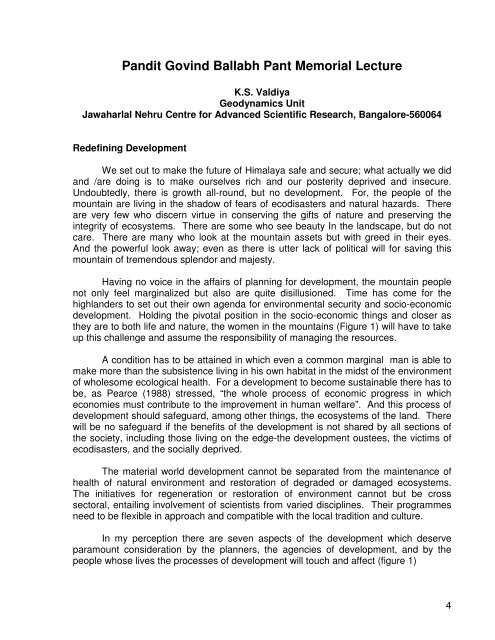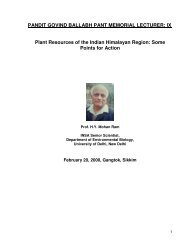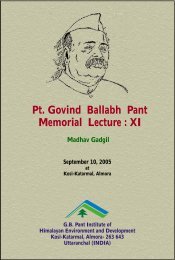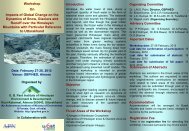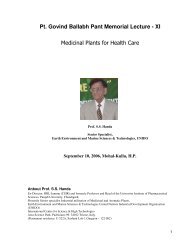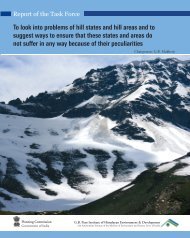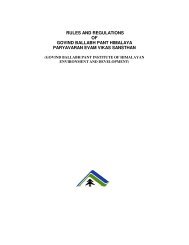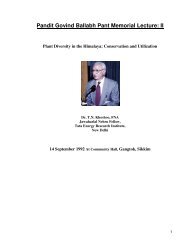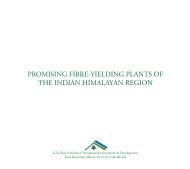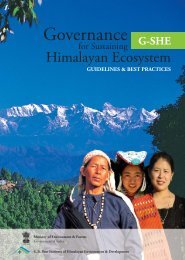PANDIT GOVIND BALLABH PANT MEMORIAL LECTURE: VII ...
PANDIT GOVIND BALLABH PANT MEMORIAL LECTURE: VII ...
PANDIT GOVIND BALLABH PANT MEMORIAL LECTURE: VII ...
You also want an ePaper? Increase the reach of your titles
YUMPU automatically turns print PDFs into web optimized ePapers that Google loves.
Pandit Govind Ballabh Pant Memorial Lecture<br />
K.S. Valdiya<br />
Geodynamics Unit<br />
Jawaharlal Nehru Centre for Advanced Scientific Research, Bangalore-560064<br />
Redefining Development<br />
We set out to make the future of Himalaya safe and secure; what actually we did<br />
and /are doing is to make ourselves rich and our posterity deprived and insecure.<br />
Undoubtedly, there is growth all-round, but no development. For, the people of the<br />
mountain are living in the shadow of fears of ecodisasters and natural hazards. There<br />
are very few who discern virtue in conserving the gifts of nature and preserving the<br />
integrity of ecosystems. There are some who see beauty In the landscape, but do not<br />
care. There are many who look at the mountain assets but with greed in their eyes.<br />
And the powerful look away; even as there is utter lack of political will for saving this<br />
mountain of tremendous splendor and majesty.<br />
Having no voice in the affairs of planning for development, the mountain people<br />
not only feel marginalized but also are quite disillusioned. Time has come for the<br />
highlanders to set out their own agenda for environmental security and socio-economic<br />
development. Holding the pivotal position in the socio-economic things and closer as<br />
they are to both life and nature, the women in the mountains (Figure 1) will have to take<br />
up this challenge and assume the responsibility of managing the resources.<br />
A condition has to be attained in which even a common marginal man is able to<br />
make more than the subsistence living in his own habitat in the midst of the environment<br />
of wholesome ecological health. For a development to become sustainable there has to<br />
be, as Pearce (1988) stressed, “the whole process of economic progress in which<br />
economies must contribute to the improvement in human welfare”. And this process of<br />
development should safeguard, among other things, the ecosystems of the land. There<br />
will be no safeguard if the benefits of the development is not shared by all sections of<br />
the society, including those living on the edge-the development oustees, the victims of<br />
ecodisasters, and the socially deprived.<br />
The material world development cannot be separated from the maintenance of<br />
health of natural environment and restoration of degraded or damaged ecosystems.<br />
The initiatives for regeneration or restoration of environment cannot but be cross<br />
sectoral, entailing involvement of scientists from varied disciplines. Their programmes<br />
need to be flexible in approach and compatible with the local tradition and culture.<br />
In my perception there are seven aspects of the development which deserve<br />
paramount consideration by the planners, the agencies of development, and by the<br />
people whose lives the processes of development will touch and affect (figure 1)<br />
4


